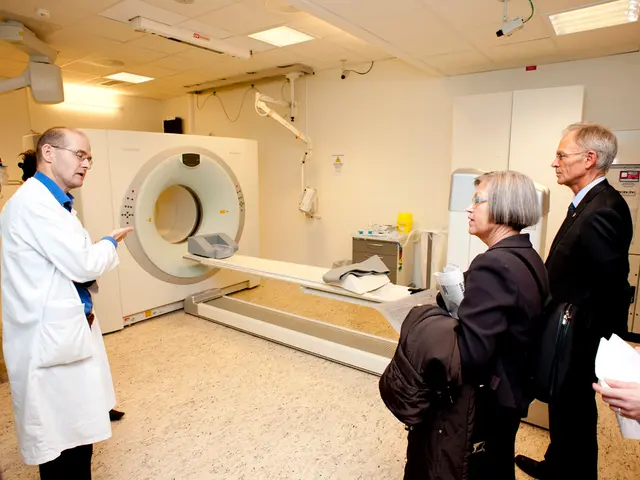Recognizing Potential Developmental Delays in Young Children: 6 Key Indicators to Watch Out For
Here's a revised article on developmental delays in children, restructured for clarity, written in an approachable and straightforward tone, and integrating pertinent enrichment data as needed:
Catching Developmental Delays in Kids
One out of every six kids in the U.S. experiences developmental delays, which can diversity their growth emotionally, mentally, and physically. As parents, it's crucial to recognize early warning signs to give your child the best chance at success. We're breakdown six key areas where these delays often crop up.
Social and Emotional Red Flags
Monitor your child's social and emotional development from 9 months to 5 years, keeping an eye out for any troublesome behaviors. Signs of a delay could include a lack of eye contact, no pointing, ignoring others, and extreme reactions. Additional milestones include smiling at others by three months, showing preferences by 12 months, and forming a sense of self and unique traits by age 2. By age 4, kids may become more independent, creative, learn to share, and empathize. At 5, they often favor friends over family and show an understanding of gender differences.
Physical Development Warning Signs
Keep an eye on your child's motor skills and movement milestones to spot any difficulties. Delays might show up as trouble rolling, sitting, or walking. Also watch for stiff or floppy muscles, and problems with balance. By 3, a toddler should be able to jump, and by 4, they should ride a tricycle. Fine motor skills can also be a concern, for example, having trouble holding a crayon or stacking blocks.
Language and Communication Indicators
Pay attention to your child's speech and communication, as developmental delays often manifest in this area. A sign of a speech delay is a lack of babbling by 9 months or not having a large vocabulary by 18 months. Not speaking in simple sentences by 3 years old is another red flag, as well as not following simple commands or using pronouns by 2, or not talking about daily activities by 4.
Cognitive Development Red Flags
Cognitive delays can make it tough for a child to solve problems, learn, and remember things effectively. Signs of problems may present as trouble following simple directions or playing pretend. If a child doesn't get excited about games or can't tell "same" from "different" it might indicate an issue. Additionally, learning and memory concerns could result in struggling to learn new things and difficulty applying that knowledge in various situations.
Vision and Hearing Warning Signs
Developmental delays can also impact a child's vision and hearing. Watch for signs like trouble following moving objects, not reacting to loud sounds, or not babbling. Other issues to watch for include eyes crossing, difficulty focusing on close things, and problems with hearing.
Remember, early intervention is the key when it comes to tackling developmental delays. Seek medical support if you notice any signs of delays and encourage your child's growth at home by promoting language, motor skills, and social interaction.
Parents of children with disabilities may require additional support in the form of caregiver programs, respite care, and financial assistance to manage their unique challenges. Consult healthcare professionals and groups like the Muscular Dystrophy Association and the National Down Syndrome Society for resources and guidance.
Sources
- Developmental Delay in Children
- Types of Developmental Delays in Children
- Developmental Delay: Causes, Symptoms, & Therapies | Cardinal Glennon
- Social Emotional Developmental Delay - Let’s Talk About It! - The PROMISE Act
- What are Social and Emotional Developmental Delays - The Warren Center | Non-profit organization in Richardson, Texas
- Developmental Red Flags - The Children’s League
- Is Your Baby’s Physical Development on Track?
- Developmental Language Disorder
- Delayed Speech or Language Development (for Parents)
- Red Flags for Common Developmental Delays in Children
- Help Me Grow MN
- Recognizing Early Signs of Developmental Delays
- Understanding Developmental Delay
- Early environmental risk factors for neurodevelopmental disorders - a systematic review of twin and sibling studies
- Addressing the Types of Developmental Delays - ECCM
- Developmental Delay: Identification and Management at Primary Care Level
- Diagnosing Developmental Delays in Children
- Therapy for Older Children with Developmental Delays
- Therapy for Infants & Toddlers with Developmental Delays
- The Role of Medication in Developmental Delays - Kutest Kids
- Caregiver Skills Training (Developmental delays/disabilities)
- Targeted Interventions Supporting Parents of Children with Special Needs, Parents Facing Special Adversities, and Parents Involved with Child Welfare Services - Parenting Matters
- Caring for Children with Intellectual and Developmental Disabilities (IDD) Introduction
Overall
Developmental delays in children under 2 can affect various areas, including social, emotional, physical, language, and cognitive development. Common types of delays include motor, language and communication, social and emotional, and cognitive delays. Early identification and intervention are key to supporting children with developmental delays.
- Strengthening communication skills is essential for addressing developmental delays in children, as it can help them express their feelings and foster better mental health.
- Encouraging equality and respect among children is crucial in promoting social skills, as it helps them understand and empathize with others, setting the foundation for a healthy and balanced society.
- Integrating health-and-wellness programs focused on mental health into schools and communities can empower parents with the tools needed to support their children with developmental delays, ensuring they have the best chance at optimal growth and development in all areas.





